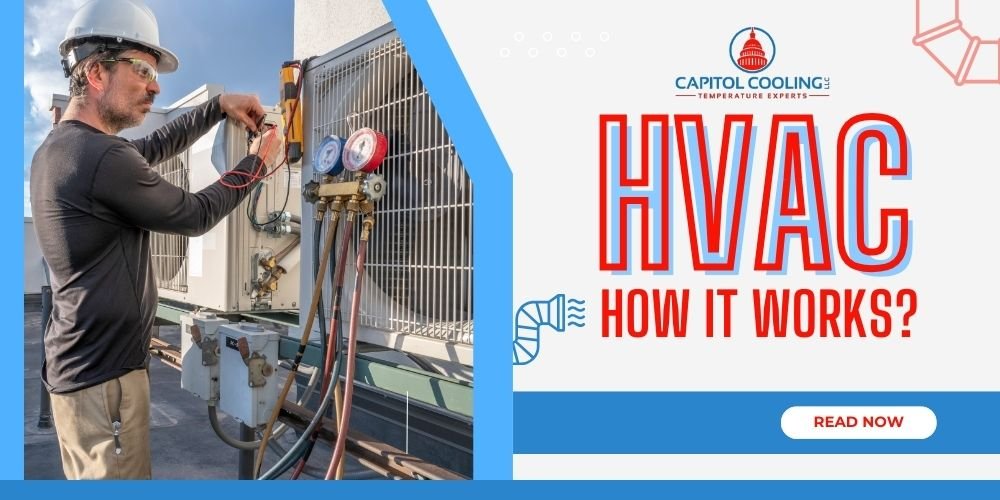What Does HVAC Stand For?
HVAC means Heating, Ventilation, and Air Conditioning. These systems are essential for maintaining indoor comfort in residential and commercial buildings. They are designed to provide heating and cooling while regulating air quality and humidity levels. An HVAC unit ensures a comfortable and healthy living environment by controlling temperature, improving air circulation, and filtering contaminants from the air.
A well-functioning HVAC system is crucial for the well-being of occupants, but not all consumers fully understand how these systems work. This blog will cover everything related to HVAC services, including HVAC installation, repair and maintenance, and how different components work together to create a fully climate-controlled environment.
The Three Fundamental Aspects of HVAC
Heating System
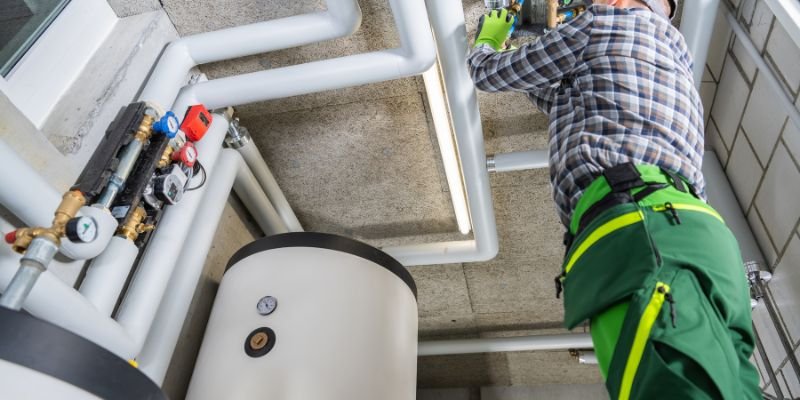
A HVAC heating system is the most common part of HVAC as it helps keep indoor temperatures comfortable during colder months. Its primary function is to generate and then distribute heat through some form of a commercial building. The heating system can come in a few different types, some of which are:
- Furnaces: These systems heat air and distribute it through ducts. They work on Gas, Oil, or electricity. The newer furnaces available today reach up to 98% efficiency, reducing waste and saving money on your energy bill.
- Boilers: Boilers use a heated hot water system or steam through piping to send heat to radiators throughout your house. Known for providing even and consistent heat, they are a popular choice where it gets cold.
- Heat Pumps: They distribute heat from warm areas to cooler ones. So, in winter, they get the heat from outside air or earth and then transfer it into your homes.
Benefits of Heating
- What does heating mean? It refers to the process of generating and distributing heat to maintain a warm and comfortable indoor environment.
- Heating units provide a warm and cozy environment during cold weather.
- Maintains a consistent temperature to prevent pipes from freezing.
- Reduces humidity levels that can lead to mold growth, ensuring a healthier living space.
Ventilation System
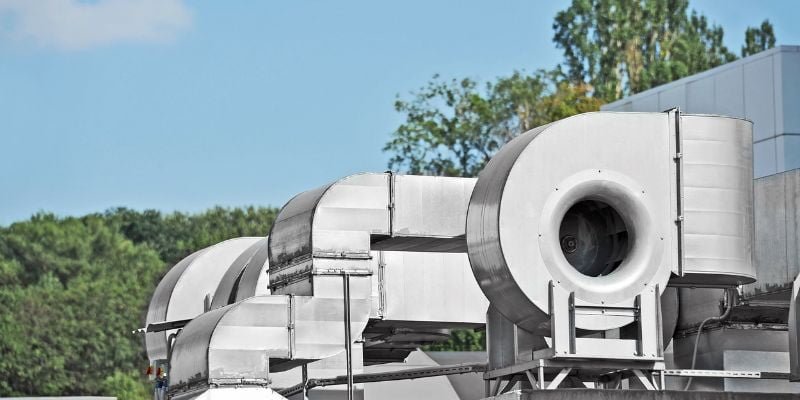
Buildings, where occupants require the exchange of indoor air with fresh outdoor air for comfort or health reasons, need ventilation system. This system decontaminates outside air and dust, eliminates odors from it drastically, and lowers too much moisture within the atmosphere, which is attributed to the development of the natural environment.
Some common types of HVAC ventilation include:
- Natural Ventilation is a building design that permits the intake of clean outdoor air and vents out stale indoor air via windows, doors, or other forms. It is an inexpensive but uncontrolled option.
- HVAC ventilation is controlled ventilation through fans and ducts. The most common exhaust ventilation types are bath and kitchen fans. For supply, it includes passive fresh air vents or smaller ducted systems. For balanced ventilation, this is a combination of both.
Benefits of Ventilation System
- Helps eliminate toxins and pollutants from the air.
- Controls moisture to effectively prevent excessive dampness and related issues.
- Creates a constant stream of fresh air to help improve air quality.
- Absolutely crucial for well-being, especially in airtight buildings with limited air exchange.
Air Conditioning Systems
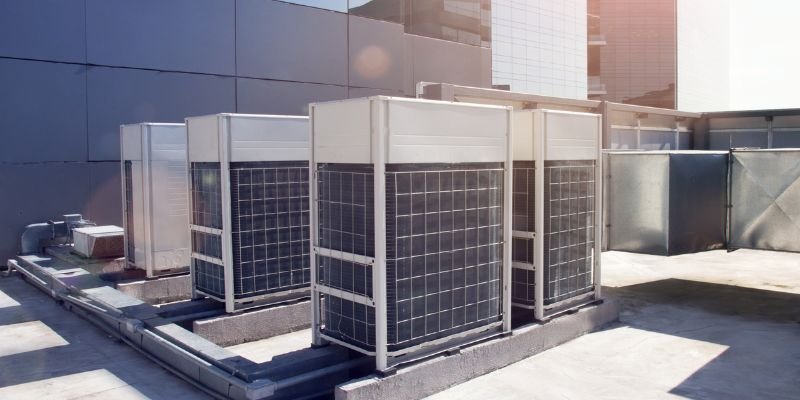
An air conditioning system is designed to cool indoor spaces and reduce humidity, ensuring a comfortable indoor temperature, especially during hot weather. Several types of AC systems can be categorized, including:
- Central Air Conditioning System: This system uses ducts to distribute cool air within buildings. It has an outdoor unit housing the compressor and condenser and an indoor unit with the evaporator.
- Window Air Conditioners: These are self-contained units mounted into windows or walls and used to cool single rooms.
Benefits of Air Conditioning System
- Heating and air conditioning maintain a comfortable indoor temperature year-round.
- It helps in reducing indoor humidity levels.
- Air conditioning can prevent heat-related illnesses by keeping indoor environments cool.
- It improves air quality by filtering out dust, pollen, and other allergens.
How HVAC Systems Work Together
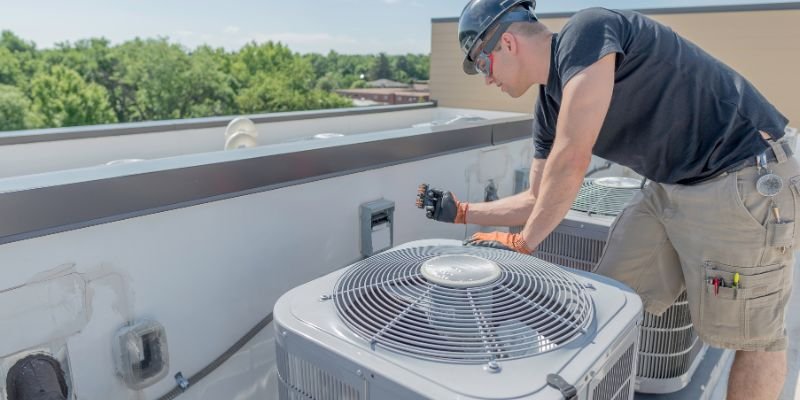
These HVAC systems integrated heating, ventilation, and air conditioning to provide complete climate control. How it works is:
- Heating and Cooling: A heating system warms the air in winter, while air conditioning works during summer. Both operate using thermostats to control and maintain the required temperature.
- Ventilation: These provide constant ventilation with fresh air, regardless of season. It can be operated with heating and cooling systems, circulate conditioned air throughout the building, and may include smoke and HEPA filters.
- Air Quality: The air inside an HVAC system is cleaned by filters, catching dust, pollen, and other particles. Many higher-end systems come with inbuilt air purifiers and humidifiers/dehumidifiers to contribute to better indoor air quality.
Benefits of Using HVAC Systems Together
- HVAC integration enhances overall comfort within the home.
- These systems lead to more efficient energy usage.
- HVAC integrated systems contribute to improved indoor air quality
- They help maintain consistent indoor comfort throughout the year, regardless of external weather conditions.
Conclusion
These HVAC systems are, therefore, critical to keeping comfortable and healthy indoor environments. The three essential components—Heating, Ventilation, and Air Conditioning—come together to deliver complete climate control. Heating systems will keep the buildings warm in cold weather. The ventilation systems ensure that fresh air keeps flowing continuously into the building. Air conditioning systems maintain a comfortable temperature during hot weather.
Advanced and modern HVAC provides improved comfort, energy efficiency, and indoor air quality. For everyone looking to upgrade or install a new HVAC system, researching available modern options and technologies opens even more excellent opportunities for further comfort and efficiency.
Choose Capitol Cooling for the best HVAC services around. Our experienced team works hard to give you the fairest possible solutions for all your heating, ventilation, and air conditioning needs. Contact Capitol Cooling to find out how our service can help you improve your comfort and care for efficiency right now.
FAQs
1. What is HVAC?
An HVAC system refers to Heating, Ventilation, and Air Conditioning. It is responsible for regulating indoor temperature, air circulation, and humidity levels to maintain comfort in homes and buildings.
2. What is the difference between AC and HVAC?
HVAC stands for Heating, Ventilation, and Air Conditioning, covering both heating and cooling functions. AC (Air Conditioning) refers only to cooling systems used to regulate indoor temperature.
3. What is Heating, Ventilation, and Air Conditioning?
Heating, Ventilation, and Air Conditioning (HVAC) systems work together to regulate
indoor temperatures, maintain air quality, and ensure energy efficiency.
Understanding what is heating, ventilation, and air conditioning can help
homeowners and businesses optimize indoor comfort and efficiency.

